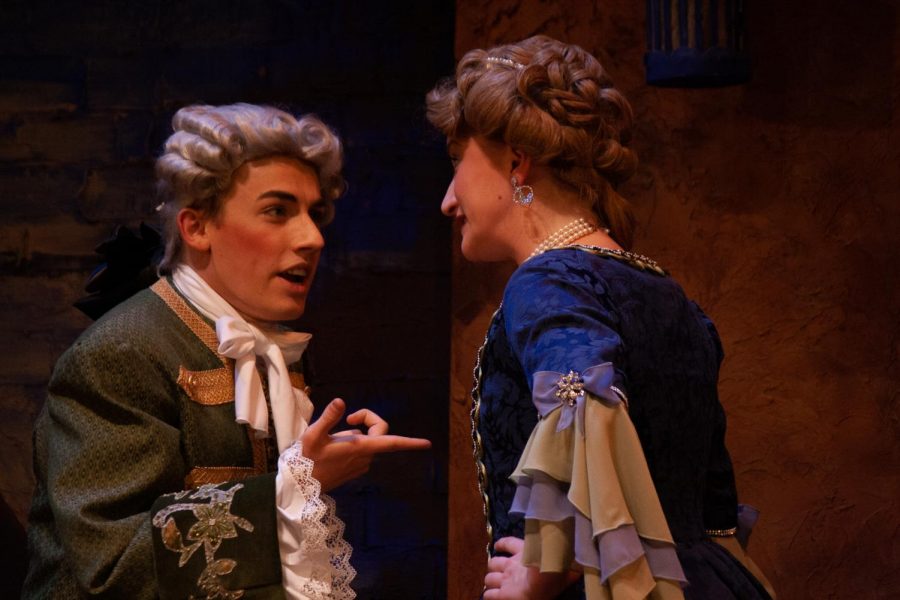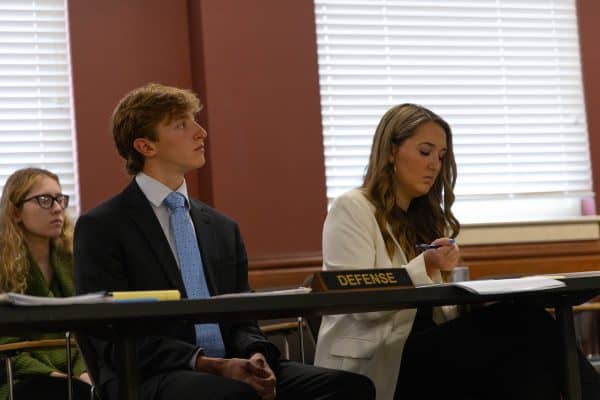‘Servant of Two Masters’ stands the test of time
February 24, 2020
This week, the UA Department of Theatre and Dance put on Carlo Goldoni’s comedic play “The Servant of Two Masters.” Set in 17th-century Italy, hilarity and chaos ensue when a servant, who is always looking for his next big meal, decides to serve two masters, one of whom carries secrets of their own.
As the lights dimmed in the Marian Gallaway Theatre, a man stood in the back of the room and jiggled the exit doors, trying his hardest to get them to close properly.
At first, no one in the crowd seemed to notice. But after five seconds of jiggling passed, then 10 seconds, members of the audience began to turn around and stare. Finally, the man managed to close the door, spinning on his heel and running up onto the stage, where it became clear that he was one of the actors in “The Servant of Two Masters” the entire time.
“The Servant of Two Masters,” a Commedia dell’arte play written by Carlo Goldoni in 17th-century Italy, follows the intermingled lives of two pairs of lovers who must desperately try to fight for their love. However, when a dead man seemingly comes back to life and a constantly hungry servant always does the wrong thing, chaos erupts in the Italian town.
The play utilizes universal themes and comedy that make it still relevant hundreds of years after it was written, Kelley Schoger, the director of the play and an assistant professor of acting and movement in the UA theatre department, said.
“The Commedia dell’arte deals with stock characters and characters in masks,” Schoger said. “So the stock characters, they represent a certain facet of certain societal roles, like the old, miserly businessman or the learned professor who claims to know more than he really does, or the lovers. They’re in these stock types, but I think these types each represent a part of ourselves. We all have a little bit of these stock characters inside ourselves, so it allows us to see all of these different facets of ourselves that we struggle within each of the stock types.”
Although four of the characters were masked while on stage, the audience never lost any emotion from the actors. At many points, the characters would turn and break the fourth wall by addressing the audience. Sometimes characters would even walk into the crowd and start chatting with audience members while something else was happening on stage.
Nathaniel Reid, the department’s marketing manager and an MFA theatre/MBA candidate, said the play is easily accessible and full of characters that anyone could enjoy.
“Commedia is the original character comedy that we still see in use today in shows like Saturday Night Live, where repeated characters become familiar joys to an audience,” Reid said.
Trinity Ross, a freshman acting BFA student who plays Clarice in the play, said that she’s excited for the audience to see that the simplicity of universal, sometimes slapstick humor is enough for a play to be relevant today.
“It is old, but human nature is not old,” Ross said. “It’s past, future and present. So I think this play is really forcing us to take a look at the most simple comedy and realize it’s great to have all of the sarcasm and everything, but it’s not necessary. Life is funny in itself, and there’s comedy in every day. I mean, how many times have we as people done something stupid? This play really forces us to look back at simple, childlike humor. Like, someone falls? Oh, that’s funny.”
The backdrop of the play, which was created by Emily Maldari, included an old, Italian brick house with a curved bridge above it that allowed the actors to interact with each other while on different levels. Above all of that, some beautiful planets and a crescent moon twinkled in a sea of stars overlooking the actors.
“I hope that they find it magical and beautiful in a way that the characters can express and feel in such a large and bold way,” Schoger said. “My thought about the play is that in the frame, we’re looking at universal experience and the beauty of that and that we’re all tied together throughout history. It doesn’t matter what period we’re in. Society might evolve and technology might evolve but at our core, we are the same. We want to love, we want to belong, we want to connect, we want pleasure, we want to eat good food. We’re still the same. That never changes. That’s a constant.”
“The Servant of Two Masters” is packed with action, whether it was a character’s long, bearded mask poking another character’s face, a “your mom” joke yelled across the stage or when the entire ensemble started chasing the servant around the stage. The play never took itself too seriously, allowing the audience to relax and laugh as the characters struggled to piece together the last puzzle pieces of their ironic lives.
“I think it is still relevant in this era, especially the one that we’re living in, to remember that it’s OK to laugh,” Ross said. “It’s OK that everything does not have to be political. I think we get a lot of headaches just from living everyday life with all the stress, especially as students here at UA. We’re always wondering like, ‘Hey, are we going to make it?’ I think that this comedy especially, and comedy in general, is such a release for everyone involved. For the actors to be able to cause a laugh and for the audience to laugh can just be therapy for a lot of people.”











